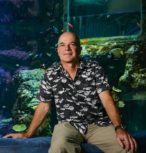DNA reveals the past and future of coral reefs
New DNA techniques are being used to understand how coral reacted to the end of the last ice age in order to better predict how they will cope with current changes to the climate. James Cook Univer

From 2005 to 2022, the main node of the ARC Centre of Excellence for Coral Reef Studies was headquartered at James Cook University in Townsville, Queensland (Australia)








Abstract:
Many short-term experiments have demonstrated the potential impacts of ocean warming and acidification on marine organisms. However, longer-term experiments are needed to test the capacity for acclimation and adaptation to these stressors. In this talk I will describe experiments being used to test the effects of elevated temperature and CO2 levels on coral reef fishes and explore their capacity for acclimation and adaptation. These same experiments are being coupled with modern molecular approaches to understand the mechanisms underlying phenotypic responses to warming and acidification. Our results indicate that exposure to higher temperatures during early life can induce beneficial developmental plasticity that improves performance at higher temperatures later in life. Parental and multigenerational exposure to elevated temperatures can have further beneficial effects on the performance of fish at higher temperatures, both through transgenerational plasticity and the presence of heritable genetic variation. However, there are limits to these beneficial effects and challenges remain in deciphering the mechanisms involved in adaptive responses across generations. While these results offer some hope for reef fishes in a warming climate, they are undermined by the degradation of coral reef habitat that is already occurring due to climate change. Reef fishes may be able to cope with a moderate increase in water temperature, but they will be severely impacted by the loss of coral habitats and changes in the physical structure of reefs induced by climate change, which will have further compounding affects on adaptive responses to climate change in fish populations.
Biography:
Professor Philip Munday has broad interests in the ecology and evolution of reef fishes. His primary research focuses on predicting the impacts that climate change and ocean acidification will have on populations and communities of marine fishes, both directly through changes in the physical environment and indirectly through effects on coral reef habitat. Using a range of laboratory and field-based experiments the research group he leads is investigating the effects of climate change on fish populations and testing their capacity for acclimation and adaptation to a rapidly changing environment.
New DNA techniques are being used to understand how coral reacted to the end of the last ice age in order to better predict how they will cope with current changes to the climate. James Cook Univer
A new study on the effects of climate change in five tropical countries has found fisheries are in more trouble than agriculture, and poor people are in the most danger. Distinguished Profess
James Cook University researchers have found brightly coloured fish are becoming increasingly rare as coral declines, with the phenomenon likely to get worse in the future. Christopher Hemingson, a
Researchers working with stakeholders in the Great Barrier Reef region have come up with ideas on how groups responsible for looking after the reef can operate more effectively when the next bleaching
Abstract: As marine species adapt to climate change, their heat tolerance will likely be under strong selection. Individual variation in heat tolerance and its heritability underpin the potential fo
Abstract: The Reef Ecology Lab in KAUST’s Red Sea Research Center explores many aspects of movement ecology of marine organisms, ranging from adult migrations to intergenerational larval dispersal
Abstract: Macroalgal meadows are a prominent, yet often maligned component of the tropical seascape. Our work at Ningaloo reef in WA demonstrate that canopy forming macroalgae provide habitat for ad
Abstract: Sharks are generally perceived as strong and fearsome animals. With fossils dating back at least 420 million years, sharks are not only majestic top predators but they also outlived dinosa
Abstract: Connectivity plays a vital role in many ecosystems through its effects on fundamental ecological and evolutionary processes. Its consequences for populations and metapopulations have been
Abstract: Evolution of many eukaryotic organisms is affected by interactions with microbes. Microbial symbioses can ultimately reflect host’s diet, habitat range, and even body shape. However, how
Abstract: The past few years have seen unprecedented coral bleaching and mortality on the Great Barrier Reef (GBR) but the consequences of this on biodiversity are not yet known. This talk will expl